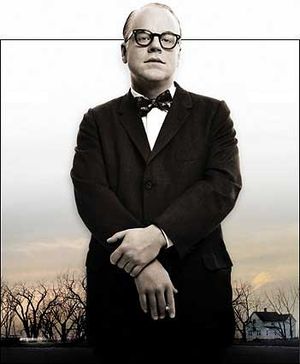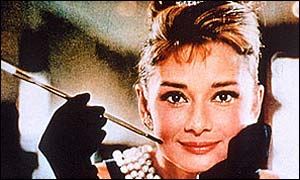Breakfast at Tiffany's Section 4: Difference between revisions
| Line 4: | Line 4: | ||
The narrator tells Holly stories of his difficult childhood. Holly talks about hers too, telling the stories of her happy childhood, at which point the narrator asks if her stories are true: did she really run away at fourteen? Holly responds by rubbing her nose and stating that the stories has been made up, only because she did not want to seem like she was competing with the narrator over who had a worse childhood. The narrator and Holly stop discussing their childhood, and Holly wants to go looking for peanut butter for her brother Fred. The narrator and Holly spend the rest of the afternoon going through a multitude of stores searching for peanut butter - which due to the war is hard to find - and end up with only six jars. | The narrator tells Holly stories of his difficult childhood. Holly talks about hers too, telling the stories of her happy childhood, at which point the narrator asks if her stories are true: did she really run away at fourteen? Holly responds by rubbing her nose and stating that the stories has been made up, only because she did not want to seem like she was competing with the narrator over who had a worse childhood. The narrator and Holly stop discussing their childhood, and Holly wants to go looking for peanut butter for her brother Fred. [[Image:Holly Golightly.jpg|thumb|left|Audrey Hepburn as Holly Golightly]]The narrator and Holly spend the rest of the afternoon going through a multitude of stores searching for peanut butter - which due to the war is hard to find - and end up with only six jars. | ||
Revision as of 22:46, 22 March 2006
Summary
On a Monday in October 1943, the narrator and Holly Golightly start off their day by drinking Manhattans and champagne cocktails at Joe Bell's bar. Later, they walk down to Fifth Avenue to watch a military parade passing by. The narrator and Holly eat lunch in Central Park, and walk around the park spending a lot of time at an old boathouse site on the lake. The narrator and Holly avoid the zoo because Holly dislikes seeing anything in a cage.
The narrator tells Holly stories of his difficult childhood. Holly talks about hers too, telling the stories of her happy childhood, at which point the narrator asks if her stories are true: did she really run away at fourteen? Holly responds by rubbing her nose and stating that the stories has been made up, only because she did not want to seem like she was competing with the narrator over who had a worse childhood. The narrator and Holly stop discussing their childhood, and Holly wants to go looking for peanut butter for her brother Fred.
The narrator and Holly spend the rest of the afternoon going through a multitude of stores searching for peanut butter - which due to the war is hard to find - and end up with only six jars.
As the narrator and Holly pass a Woolworth’s, Holly pulls the narrator into the store and talks him into stealing Halloween masks. The two of them put on masks while the sales lady is occupied, and walk out. They run a few blocks away, not because they are being chased, but from the exhilaration of stealing. Holly tells the narrator how she had to steal in the past just to get by, and how she likes to steal things once in a while just to stay in practice.
Notes
- Delicatessen (55) — a type of food store. A North American delicatessen is often referred to, informally or affectionately, as a deli.(http://en.wikipedia.org/wiki/Delicatessen). A delicatessen on Third Avenue is where the narrator and Holly Golightly buy the last of six jars of peanut butter.
- Fifth Avenue (53) — a major thoroughfare in the center of the boroughs of Manhattan and the Bronx in New York City, USA; a symbol of wealthy New York (http://en.wikipedia.org/wiki/Fifth_Avenue). The narrator and Holly Golightly wander to Fifth Avenue where a parade is going on.
- Manhattans (53) — a cocktail consisting of vermouth, whiskey, and sometimes a dash of bitters. (http://www.m-w.com/dictionary/manhattan). The narrator and Holly enjoy Manhattans one day at Joe Bell's bar.
- Peanut butter (54) — a food product usually consisting of roasted and ground peanuts, usually salted and sometimes sweetened. (http://en.wikipedia.org/wiki/Peanut_butter). Holly decides to send her brother Fred six jars of peanut butter that he loved.
- Woolworth's (55) — an extensive chain of five-and-ten-cent stores throughout the U.S. (http://www.m-w.com/dictionary/woolworth). As the narrator and Holly pass a Woolworth's store, she asks the narrator to steal something with her. They leave the store wearing stolen Halloween masks.
Commentary
Holly's dislike for cages emulates her own feelings that she doesn't like to be caged, or tied down. Holly's indirect reference to herself as a wild thing (74) is mirrored thought the novel. She never names the cat because she says she doesn't own it, she refuses to call the narrator by his real name, instead she insists on calling him Fred. All of these things are because she doesn't want to belong to anyone or anything. She wants to remain an independent spirit. What she doesn't realize, is that even with her attempts to keep herself distanced from everyone, she still has an impact on their life, she is still part of their life.
Study Questions
- Why do the narrator and Holly avoid the zoo?
- Holly had been on her own since what age?
- With whom is the saleslady occupied when the narrator and Holly enter the store?
- What do they steal?
- What does Holly say that she should send Fred?
- This section takes place during what season?
- How do they start the day off?
- Why did Holly say that she stole every now and then?
External Resources
Works Cited
- Capote, Truman. Breakfast at Tiffany's. New York: Vintage Books - A division of Random House, 1993.
- Pugh, Tsion. "Capote's Breakfast at Tiffany's". Capote's Breakfast at Tiffany's Fall 2002: 51-53.
- Smith, Liz. "My Friend Truman Capote". Harper's Bazaar March 2006: 426-428.


